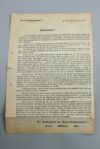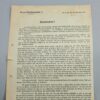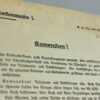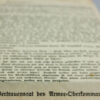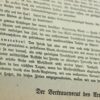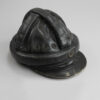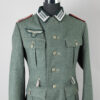Appeal from the army high command to the soldiers in 1918
Inventory number: DPM 6.260.1
The end of the war in 1918: the weapons on the fronts of the First World War were at rest, while the November Revolution shook the German Reich. The soldiers in the garrisons organized themselves into soldiers’ councils independent of the command structures and made political and social demands. Together with the workers’ councils, they campaigned for peace negotiations and the removal of the monarchy, among other things.
The proclamation of the republic on 9 November 1918 stabilized the political situation for the time being. The Supreme Army Command under Erich Ludendorff and Paul von Hindenburg was actually in favor of retaining the monarchy; however, as this was hopeless, it sided with Ebert’s government. This temporary fraternization of the military with the SPD should not obscure the fact that the protagonists had incompatible ideas about the state.
In competition with the soldiers’ councils, which had also been formed in the field armies in the meantime, General von Hindenburg ordered the formation of councils of confidence in all units on 10 November. In close cooperation with the command authorities, these were to ensure the retention of military hierarchies and structures and thus the orderly repatriation of soldiers. Hindenburg feared that soldiers returning home might join revolutionary movements such as the Spartacus League.
Almost three weeks after the proclamation of the republic, the Army High Command I published a leaflet directed against the Spartacus group, which was led by Rosa Luxemburg and Karl Liebknecht: “The aims of the Liebknecht people are well known: They would mean the continuation of the war against the Entente in order to then build a rule hand in hand with the Russian Bolsheviks on the ruins.” The soldiers “desire for peace and the fear of a civil war like the one in Russia a year earlier were used for the political struggle against the radical left-wing movement. The Spartacus League was committed to transforming the concept of the councils into a soviet republic. However, the majority of the soldiers” councils saw themselves merely as a transitional organization to be replaced by a parliamentary-democratic national assembly.
Hindenburg had an interest in the rapid formation of a government so that it could enter into peace negotiations: “The enemy has not yet made peace with us; nor will he do so with a worn-down and disintegrated state, just as little as with a Germany that has disintegrated into individual states.” As the new government under Ebert conducted the peace negotiations, those who had waged the war did not have to answer for it. The stigma of “Versailles” thus clung to the new democratic government from the outset, while the senior military officers sought to absolve themselves of responsibility by constructing the “stab-in-the-back legend”.
Object of the month
(short) stories from the depot
Unfortunately, many objects cannot currently be shown in the exhibition for conservation reasons. Here you will find unusual objects and exciting stories of special pieces from the depot

